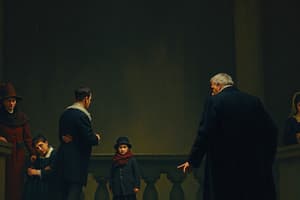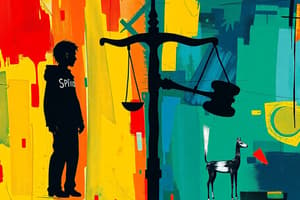Podcast
Questions and Answers
Who is widely referred to as the 'Father of Criminology'?
Who is widely referred to as the 'Father of Criminology'?
Cesare Lombroso
What does social conflict theory criticize regarding capitalism?
What does social conflict theory criticize regarding capitalism?
Disparity of income that results
Which theory focuses on how dominant society members control minorities through institutions?
Which theory focuses on how dominant society members control minorities through institutions?
Social Conflict Theory
According to social disorganization theory, which factor does NOT lead to crime in disorganized neighborhoods?
According to social disorganization theory, which factor does NOT lead to crime in disorganized neighborhoods?
According to Beccaria, which statement is NOT true?
According to Beccaria, which statement is NOT true?
What is an explanation of a happening or circumstance based on observation, experimentation, and reasoning called?
What is an explanation of a happening or circumstance based on observation, experimentation, and reasoning called?
What do classical theorists believe a crime is an expression of?
What do classical theorists believe a crime is an expression of?
Crime prevention policies associated with social process theory focus on __________.
Crime prevention policies associated with social process theory focus on __________.
What hormone has been linked to elevated levels of criminal activity in males?
What hormone has been linked to elevated levels of criminal activity in males?
The example of studying for two hours every day and knowing the answers represents a _______.
The example of studying for two hours every day and knowing the answers represents a _______.
For the positivist, behavior is considered to be:
For the positivist, behavior is considered to be:
Gottfredson and Hirschi attribute low self-control primarily to:
Gottfredson and Hirschi attribute low self-control primarily to:
In classical criminology, what is the aim of punishment?
In classical criminology, what is the aim of punishment?
What effect does labeling an individual have?
What effect does labeling an individual have?
Practitioners of life course criminology assert that strong predictors of future criminal behavior can be evaluated through what?
Practitioners of life course criminology assert that strong predictors of future criminal behavior can be evaluated through what?
Rational choice theory is an updated version of what?
Rational choice theory is an updated version of what?
Who studies the causes of crime?
Who studies the causes of crime?
What does social conflict theory focus on?
What does social conflict theory focus on?
Social conflict theory includes issues of:
Social conflict theory includes issues of:
According to Elijah Anderson, most 'decent' families in disadvantaged areas include all of the following, except:
According to Elijah Anderson, most 'decent' families in disadvantaged areas include all of the following, except:
Strain theory has its roots in the concept of:
Strain theory has its roots in the concept of:
What correlation does the Chicago School show?
What correlation does the Chicago School show?
The belief that illegal drug abusers are a danger to society is consistent with what model?
The belief that illegal drug abusers are a danger to society is consistent with what model?
In the study published in 'Delinquency in a Birth Cohort', what percentage of juvenile offenders were responsible for the majority of violent crime?
In the study published in 'Delinquency in a Birth Cohort', what percentage of juvenile offenders were responsible for the majority of violent crime?
The study of crime based on behavioral patterns developed in childhood is called:
The study of crime based on behavioral patterns developed in childhood is called:
Flashcards are hidden until you start studying
Study Notes
Criminology Foundations
- Cesare Lombroso is recognized as the "Father of Criminology."
- Classical theorists view crime as a result of rational decision-making processes.
Theoretical Perspectives
- Social conflict theory critiques capitalism, linking economic disparity to increased violence and crime.
- Key concept of social conflict theory: dominant society members use criminal laws and institutions (police, courts, prisons) to control minorities.
Factors Affecting Crime
- Social disorganization theory identifies neighborhood conditions as contributing factors to crime; however, a high number of children do not lead to crime in disorganized neighborhoods.
- According to strain theory, crime is rooted in the concept of anomie, reflecting a breakdown of social norms.
Crime Prevention and Control
- Crime prevention policies under social process theory target juvenile offenders.
- Labeling theory suggests that labeling individuals affects their self-concept and future behaviors.
Behavioral Influences
- Criminal activity in males is correlated with elevated testosterone levels.
- Low self-control, as per Gottfredson and Hirschi, is primarily caused by poor parenting.
Punishment and Deterrence
- In classical criminology, punishment serves to deter future criminal activity.
- Positivist perspectives argue that behavior is beyond individual control.
Research and Predictions
- Criminologists study crime causation and patterns.
- Life course criminology suggests that early childhood behaviors are strong predictors of future criminal behavior.
Social Dynamics
- The Chicago School established a correlation between crime and neighborhood conditions.
- Elijah Anderson’s research highlights that "decent" families in disadvantaged areas lack negative parental discipline.
Drug Addiction Perspectives
- The belief that illegal drug abusers are a societal danger aligns with the criminal model of addiction.
- Research published in Delinquency in a Birth Cohort indicated that 6% of juvenile offenders are responsible for a majority of violent crime.
Theoretical Updates
- Rational choice theory updates classical theory, maintaining its focus on decision-making.
- Social conflict theory encompasses issues of power and wealth within society.
Studying That Suits You
Use AI to generate personalized quizzes and flashcards to suit your learning preferences.




